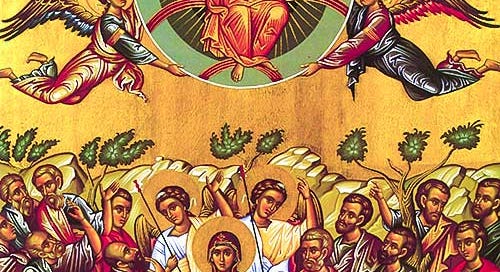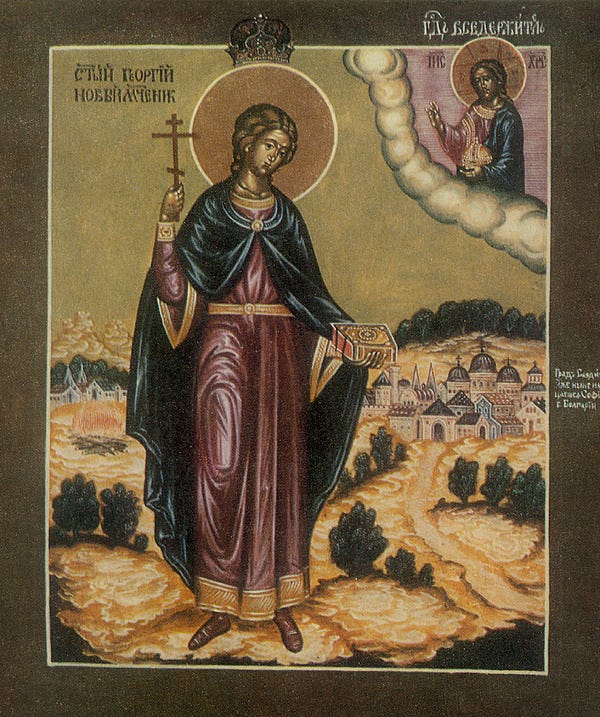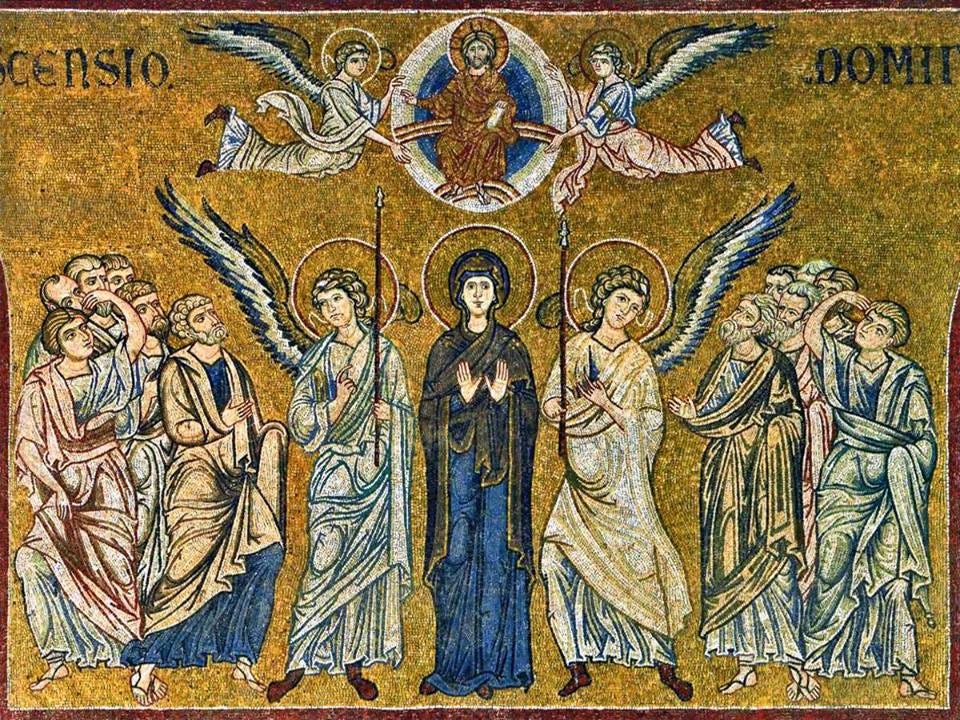“My sheep follow me,” says Christ.
By a certain God-given grace,
believers follow in the footsteps of Christ.
No longer subject to the shadows of the Law ,
they obey the commands of Christ,
and guided by His words,
rise through grace,
to His own dignity,
for they are called children of God.
When Christ ascends into heaven,
they also follow Him.”
+ St Cyril of Alexandria (376-444)
Acts 17:1-15 (Epistle)
1 Now when they had passed through Amphipolis and Apollonia, they came to Thessalonica, where there was a synagogue of the Jews.
2 Then Paul, as his custom was, went in to them, and for three Sabbaths reasoned with them from the Scriptures,
3 explaining and demonstrating that the Christ had to suffer and rise again from the dead, and saying, “This Jesus whom I preach to you is the Christ.”
4 And some of them were persuaded; and a great multitude of the devout Greeks, and not a few of the leading women, joined Paul and Silas.
5 But the Jews who were not persuaded, becoming envious, took some of the evil men from the marketplace, and gathering a mob, set all the city in an uproar and attacked the house of Jason, and sought to bring them out to the people.
6 But when they did not find them, they dragged Jason and some brethren to the rulers of the city, crying out, “These who have turned the world upside down have come here too.
7 Jason has harbored them, and these are all acting contrary to the decrees of Caesar, saying there is another king – Jesus.”
8 And they troubled the crowd and the rulers of the city when they heard these things.
9 So when they had taken security from Jason and the rest, they let them go.
10 Then the brethren immediately sent Paul and Silas away by night to Berea. When they arrived, they went into the synagogue of the Jews.
11 These were more fair-minded than those in Thessalonica, in that they received the word with all readiness, and searched the Scriptures daily to find out whether these things were so.
12 Therefore many of them believed, and also not a few of the Greeks, prominent women as well as men.
13 But when the Jews from Thessalonica learned that the word of God was preached by Paul at Berea, they came there also and stirred up the crowds.
14 Then immediately the brethren sent Paul away, to go to the sea; but both Silas and Timothy remained there.
15 So those who conducted Paul brought him to Athens; and receiving a command for Silas and Timothy to come to him with all speed, they departed.
John 11:47-57 (Gospel)
47 Then the chief priests and the Pharisees gathered a council and said, “What shall we do? For this Man works many signs.
48 If we let Him alone like this, everyone will believe in Him, and the Romans will come and take away both our place and nation.”
49 And one of them, Caiaphas, being high priest that year, said to them, “You know nothing at all,
50 nor do you consider that it is expedient for us that one man should die for the people, and not that the whole nation should perish.”
51 Now this he did not say on his own authority; but being high priest that year he prophesied that Jesus would die for the nation,
52 and not for that nation only, but also that He would gather together in one the children of God who were scattered abroad.
53 Then, from that day on, they plotted to put Him to death.
54 Therefore Jesus no longer walked openly among the Jews, but went from there into the country near the wilderness, to a city called Ephraim, and there remained with His disciples.
55 And the Passover of the Jews was near, and many went from the country up to Jerusalem before the Passover, to purify themselves.
56 Then they sought Jesus, and spoke among themselves as they stood in the temple, “What do you think – that He will not come to the feast?”
57 Now both the chief priests and the Pharisees had given a command, that if anyone knew where He was, he should report it, that they might seize Him.
Greatmartyr George the New at Sofia (Bulgaria—1515)
The Holy Martyr George the New was born into an illustrious Bulgarian family, living in the capital city of Bulgaria, Sredets (now the city of Sofia). Saint George’s childless parents, John and Mary, in their declining years entreated the Lord to send them a child. Their prayer was answered, and they baptized the infant with the name of the holy Great Martyr George (April 23).
Young George received a fine upbringing, he attentively studied the Holy Scriptures, and he was pious and chaste. His parents died when George was twenty-five. At that time Bulgaria found itself under the rule of the Turks, who forcibly converted Christians to Islam.
Once, several Moslems tried to convert George. They put a fez on the saint’s head. This is a red circular hat which Moslems wear to enter their house of prayer. But George threw the fez on the ground. The Turks brought the martyr to their governor with beatings and abuse.
The governor was impressed with Saint George’s appearance and bearing, and he urged him to accept Islam, promising honors and wealth from Sultan Selim (1512-1520). The saint boldly and steadfastly confessed his faith in the Lord Jesus Christ, and reproached the errors of Islam. The governor in a rage gave orders to beat Saint George with rods, but the saint persevered in his confession of faith in Christ.
The governor ordered the tortures to be increased. The passion-bearer bore all his sufferings, calling on the Lord Jesus Christ for help. Then they led the martyr through the city to the beat of a drum and shouts: “Do not insult Mohammed nor abase the Moslem faith”.
Finally, a large fire was lit in the city, to burn Saint George. Weakened by his wounds, the saint fell to the ground. They threw him into the fire still alive, and they threw corpses of dogs on top of him so that Christians would not be able to find the relics of the martyr.
Suddenly, a heavy rain fell and extinguished the fire. With the onset of darkness, the place where the body of the martyr was thrown was illumined with a bright light. They gave permission to a certain Christian priest to take the venerable relics of the martyr for burial. Informed about the occurrence, Metropolitan Jeremiah and his clergy went to the place of execution. In the ashes of the fire they located the body of the holy Martyr George and carried it to the church of Saint George the Great Martyr in the city of Sredets.
On May 26, 1515 the holy relics of Saint George were removed from the grave, placed in a coffin, and then brought into the church, where they have remained ever since. The Church honors Saint George twice during the year: on February 11, the day of his martyrdom, and on May 26, the uncovering of his holy relics.
The Christianity of the Ascension: Our Potential in Christ
by Fr. Andrew Stephen Damick
From middle school all the way through high school, if you could chart a single theme in the comments that teachers would make to my parents, whether in parent-teacher conferences, report cards, or notes sent home, that theme would be this: “Does not work up to potential.” Whether it was my B-minus graduating GPA in high school, my occasional complete failure to turn in homework, or my lackluster approach to the beginning of college, it was clear that I was not a particularly inspired student.
I put my heart into other things, whether it was the theatre crowd in high school or playing around on the Internet in college.
With a lot of grace I did better in seminary. One of lessons that I have taken away from my time in formal education is that if I do not have any sense of what I am trying to achieve in a task, especially a long-term one, my results will not be very good. This seems obvious enough, but I am sure that many of you have known (or, like me, perhaps have been) people who do not work up to potential. We have to know what we’re trying to achieve. The principle is obvious, but what is it that gets in the way?
The failure to live up to potential is based in a lack of vision, not knowing or not focusing on our purpose. At the same time, even if there is some vision, it can be blurred by distractions that pull our hearts away from what is needed.
This weekend, we are continuing to celebrate the Great Feast of the Ascension of Christ, a theme that continues until this Friday. Like many of the Great Feasts of the Church, our celebration of the Ascension lasts for more than one day; therefore we continue to contemplate what this feast means for us and for our salvation in Christ.
In the Ascension, in a way distinct from on the Cross or in the Resurrection, we see the fulfillment and purpose of Christ’s mission to Earth. Through the Cross and the Resurrection, Christ tramples upon death and destroys its hold over us. And in the Ascension, we see what the purpose of death’s destruction was. We see what is now possible for us because of the Cross and Resurrection.
So what happens at the Ascension?
On the most obvious level, we might say that in the Ascension, Jesus is going back home. After spending about thirty-three years on Earth, having accomplished what He came to do, He is returning to His Father. But He is bringing something back with Him—humanity.
Whenever we recite the Nicene Creed, we affirm that He “ascended into Heaven and sat down at the right hand of the Father.” We’re not just telling the story here, that Jesus did what He came here to do and then went back to Heaven. When He ascended, the disciples who stood there on the Mount of Olives saw Him go up into Heaven not as a spirit or ghost. They saw Him ascend with His human body and all that it means to be human, including a soul, mind, will—everything.
So now the Son of God is sitting at the right hand of God the Father, right where He belongs, right where He paradoxically never left even while spending thirty-three years with us here on Earth. But now, as of the Ascension, included in the divine Person of the Son of God at that divine right hand is human nature. There is now a human man sitting at the right hand of the Father! There, in that place beyond place, that location beyond all sense of time and space, that reality impossible for us to fathom, incredible to human reason, ineffable to human experience, is a human man with a body just like ours, a soul just like ours, emotions just like ours, a mind just like ours. He is one with us, just as He is one with His Father. So there sits the God-man.
So what does this have to do with working up to our potential? Many Christians in America these days have no sense of the Ascension. For most of them, it’s not even on their calendar. For those who do not pay attention to the Ascension, Christian life consists mainly in waiting to go to Heaven when they die. In the meantime, they work on morality and maybe politics. Or they mainly work on expanding the size of their congregations. Or perhaps they devote themselves to social problems.
But this is a reduced Christianity. This is not the Christianity of the Ascension.
This reduced Christianity is about the things you do after you have the conversion experience. You’re a Christian now, so now you go out there and work on other people rather than yourself.
What is so seductive about this reduced Christianity is that it appeals to our desire not to live up to the potential of the Christianity of the Ascension. We settle for a lot less. But in the Orthodox tradition salvation in Christ is not a “Get Out of Hell Free” card that we get to play at the end of our lives, preceded by a few decades of religious activism in the meantime. Salvation means union with Jesus Christ, which takes dying to ourselves, putting Him on in baptism, and then growing into His likeness, becoming more and more suffused with the power and energy of the Holy Trinity, rising from the dead at the end of time and then ascending with Him to glory. The Ascension is our destiny as Christians. If we are in Christ, we sit at the right hand of God the Father, participating in the glory and the majesty of the Godhead, experiencing the divine life of God Himself.
Getting to that point, where we ascend with Him from the Mount of Olives, requires extended effort and focus. We have to be inspired. We have to want it so badly that we will do whatever it takes to get it. If we are not willing to be crucified with Him, then we are not headed toward the Ascension. If we are not willing to set aside everything for Him, then we are not headed toward the Ascension. If we love Him, we will keep His commandments, and if we do not keep them, how can we say we love Him? And if we do not love Him, how can we expect to be in communion with Him, not to mention “happily ever after” in Heaven?
In today’s Gospel reading from John chapter seventeen, in one of my favorite passages in Scripture, the Lord Jesus tells us what it means to have eternal life. He says this: “And this is eternal life, that they know Thee the only true God, and Jesus Christ Whom Thou hast sent.” Are we doing what it takes to know God? Everyone wants eternal life, but is that proven by the pursuit of knowing God?
If we want eternal life, then that means knowing God. So how do I get to know God so that I can have eternal life? It starts with Jesus, Who is the Son of God Who reveals to us the Father. The place to begin is really getting to know Him in the Gospels, by reading them all and getting to know them well. It also takes prayer. When you want to get to know someone, you spend time with him. You can’t do it just by reading about him or hearing someone else talk about him. You’ve got to get your own experience.
As time goes by, and we participate in all these things, especially in the sacraments, the holy mysteries where Jesus touches us directly, we find that we really do know Him, know His character, His personality, the way He communicates and acts. We find that we can’t imagine life without Him. We find that we begin to imitate Him. Doesn’t this happen with all our friends? The more time we spend with them, the more we become like them.
Jesus Christ took the initiative. He came to earth and became like us. He spent time with us. He is still here, spending time with us. So we respond. And we follow Him everywhere—the Cross, death, the Resurrection and the Ascension.
As Orthodox Christians, we do what it takes to follow Him everywhere, even when we don’t feel like it or are tempted by other priorities. Why? Because if we are not pressing toward perfection, then we are not following Christ to His Ascension. Achieving perfection is not what is required for union with Christ or life in Heaven with Him, but striving for perfection is. If we don’t even try, we will not be able to ascend with Him, because we will be too weighed down by the heavy and temporary cares of this world. But if we strive with inspiration and focus, then we will ascend with Him. That is our potential. Let’s live up to it.
To the ascended Jesus Christ therefore be all glory, honor and worship, with His Father and the Holy Spirit, now and ever, and unto ages of ages. Amen.
This week’s calendar reminders:
Monday 5/26: Matins 8:30 a.m.
Tuesday 5/27: no services or events
Wednesday 5/28: no services or events
Thursday 5/29: Matins 8:30 a.m.
Friday 5/30: Matins 8:30 a.m.
Saturday 5/31: Catechumen Class 4:30 p.m.; Great Vespers 6 p.m.
Sunday 6/1: Divine Liturgy 9:15 a.m.
CLICK BELOW to donate online:
Christ the Savior Orthodox Church is located in Southbury, Connecticut, and is part of the New England Diocese of the Orthodox Church of America.
Mailing address: Christ the Savior Church, 1070 Roxbury Road, Southbury, CT 06488
PLEASE DONATE to help our parish do the work of the Lord, thrive and grow, and extend the Kingdom of God. May the Lord bless your generosity!
Fr. Moses Locke can be reached at frmoseslocke@gmail.com











